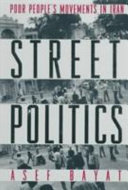Urban Informality And The State
Repairing Cairo’S Waters Through Gehood Zateya

Overview
Equitable and just access to urban water presents challenges for global policymakers. In Egypt, providing and maintaining access to water has always been associated with the state. Recently, however, in cities such as Cairo, water shortages have led to the inclusion of multiple actors in the complicated processes of water access and repair. This paper argues that the state’s hegemonic control over water governance is contested by increasingly blurred binaries of formal and informal everyday practices. I show how water governance in Cairo operates through a plurality of informal practices – gehood zateya (individual and community efforts) – which cross boundaries of class, legality and space. By drawing on theories of hybrid infrastructures and urban informality, water access and repair in Cairo emerge as relational processes shaped by sociotechnical practices of state and non-state actors. This paper explores two case studies demonstrating the politicization of repair in a marginalized informal area and elite/middle-class gated communities. These cases illustrate how residents living in informal areas maintain relations with the state through community water systems and ‘cultures of repair’, while elite residents engage in ‘private governance’ schemes and rely on networks of privilege. This article offers insights into changing state-society relations during transitions to water privatization and the shaping of Cairo’s uneven urban waterscape

